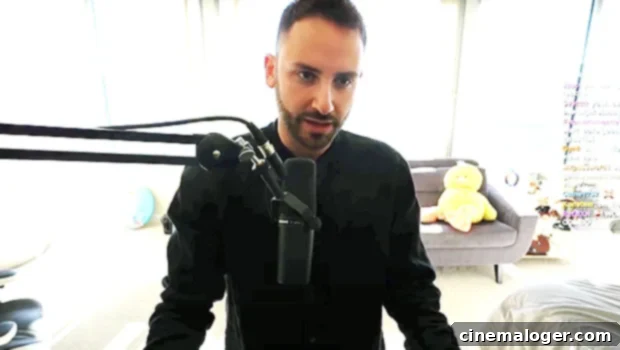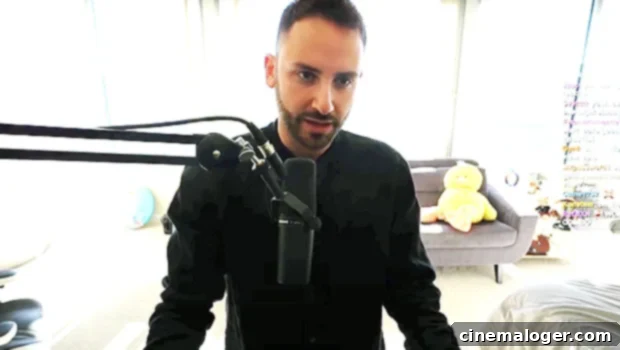Remembering Reckful: The Enduring Legacy of Byron Bernstein, a Pioneering Twitch Streamer and Mental Health Advocate
The gaming world, and indeed the internet at large, was plunged into mourning on July 2, 2020, with the devastating news of Byron Bernstein’s passing. Known to millions across the globe by his online alias ‘Reckful,’ the beloved Twitch streamer and former professional *World of Warcraft* player died at the age of 31. The news, initially shared by his close friends on social media, was soon officially confirmed by Twitch, the very platform where Reckful had built a monumental career and fostered a unique community.
Byron ‘Reckful’ Bernstein was a trailblazer, a charismatic and deeply honest personality who left an indelible mark on the burgeoning streaming industry. His impact extended far beyond his exceptional gaming skills; he became an unlikely yet powerful voice for mental health awareness, openly sharing his struggles with depression and bipolar disorder in a way that resonated deeply with his audience. His passing ignited a global conversation about mental health, particularly within the online community, underscoring the vital importance of support and understanding.
Rest in peace, Reckful.https://t.co/dyRnzfMLU3 pic.twitter.com/Va9Ybyc94Q
— Twitch (@Twitch) July 2, 2020
In a poignant statement shared via Twitter, Twitch expressed its profound sorrow: “We’re devastated to hear of Byron’s passing. Our hearts go out to his family, friends, and community. He was a streaming pioneer and helped propel the whole industry forward.” This sentiment captured the essence of Reckful’s contribution – not just as an entertainer, but as someone who genuinely shaped the landscape of online entertainment. Details surrounding his death, as confirmed by reports citing close sources, indicated he died by suicide. This tragic end highlighted the very struggles he so bravely discussed, leaving his vast community grappling with immense grief and a renewed focus on the complexities of mental illness.
The Rise of a Gaming Icon: From Warcraft Pro to Twitch Pioneer
Byron Bernstein, who reportedly resided in Austin, Texas, was just 31 years old at the time of his death. While specific details about his immediate family survivors remain private, it was a known part of his personal history that one of his older brothers had also died by suicide during Byron’s childhood, a traumatic event that undoubtedly shaped his life and outlook. Before his rise to streaming stardom, Byron had already carved out a significant name for himself in the competitive gaming scene. He was widely recognized as one of the most skilled and innovative players in Blizzard’s massively multiplayer online role-playing game, *World of Warcraft*. His exceptional talent propelled him to achieve the highest rating in the game, a feat that solidified his status among the elite. This unparalleled skill laid the foundation for his transition into streaming.
As Twitch began to gain traction, Reckful seamlessly transitioned his competitive gaming prowess into engaging live content. He quickly amassed a massive following, approaching nearly one million dedicated followers on the platform. His streams weren’t just about high-level gameplay; they were a unique blend of impressive skill, raw honesty, and interactive community engagement. He played various games, explored new titles, and shared snippets of his daily life, creating a bond with his audience that transcended typical streamer-viewer relationships. Beyond his streaming career, Byron was actively involved in the development of his own game, *Play Everland*. Described as a “social online world releasing in 2020, hoping to help people find friendship and a sense of community,” this project reflected his desire to create spaces where people could connect and combat loneliness – a testament to his understanding of the importance of community and mental well-being.
A Champion for Mental Health: Reckful’s Open Battle with Depression
Perhaps Reckful’s most profound legacy lies in his unwavering commitment to discussing his mental health struggles openly and honestly. Byron was an outspoken advocate, using his expansive platform on Twitch, Instagram, Twitter, and YouTube to shed light on his longtime battles with depression and bipolar disorder. In an era where mental health often remains stigmatized, especially among public figures and in the gaming community, Reckful broke barriers by sharing his vulnerabilities, fears, and daily challenges. His candidness created a safe space for countless others to acknowledge their own struggles, feel less alone, and seek help.
Twitch itself acknowledged his significant contribution to this cause in their statement following his death: “Byron was someone who talked about his struggles to help make room for others to do the same.” The platform further emphasized the societal challenge, stating, “As we process this loss, we have to recognize that the stigma around mental health and treatment often prevents people from seeking and getting the help they need.” This recognition from a major corporation highlighted the immense personal impact Byron had, transforming his private struggles into a public service that fostered greater empathy and understanding across his community and beyond.
In a moment of profound hope, Byron revealed in January 2020 that he felt he was “no longer depressed.” A video uploaded to his YouTube channel on January 7, 2020, titled “Reckful has been battling depression for 16 years… until now,” captured this hopeful turning point. In the video, he expressed, “I am actually day-to-day happy. I’ve never felt this way in my life. I’m not saying it’s gonna last forever, but right now I’m happy.” This declaration was met with immense joy and relief from his community, who had witnessed his long and arduous journey. It served as a powerful reminder of the potential for recovery and happiness, even in the face of long-standing mental illness, making his eventual passing all the more heartbreaking and a stark reminder of the unpredictable nature of these conditions.
A Final, Heartbreaking Plea and Becca’s Poignant Response
In the hours leading up to his death, Byron shared a series of deeply personal and emotionally charged tweets that included a proposal to his ex-girlfriend, Becca. These messages painted a picture of a man wrestling with profound internal struggles, desperately seeking connection and understanding. He posted a collection of photos and asked Becca to marry him, acknowledging the unconventional nature of his proposal and the fact that they hadn’t seen each other in six months. “I know I’ll always be a little too crazy… and this is proof… but at least you’ll never be bored will you marry me, Becca?” he tweeted, a raw and honest expression of his complex emotions.
He followed up with cautionary notes, perhaps an attempt to manage expectations or explain his state of mind. “DO NOT make her feel pressured to say yes, I am completely insane here I have not seen her in 6 months,” Byron wrote, adding a layer of self-awareness to his desperate plea. He continued, “The reason for the post is I know she’s the one I want forever, and I wanted her to know my commitment is real.” These tweets were followed by others expressing his internal turmoil: “I feel bad for anyone who has to deal with my insanity.” He then added a crucial insight into his experience with mental illness: “Please just know in these situations the insane person does not feel in control of their actions,” he continued. This statement offered a window into the overwhelming nature of his struggles, underscoring the immense power that mental illness held over him.
Following the tragic news of his death, Becca addressed Byron’s proposal with heartbreaking candor and deep emotion. “I didn’t see the proposal until it was too late but that doesn’t change the fact that I wasn’t able to be there for him,” she tweeted. Her words conveyed a profound sense of loss and regret, highlighting the pervasive helplessness felt by those who love someone struggling with severe mental health issues. She went on to describe the immense impact Byron had on her life: “He was amazing. He taught me how to have fun, to experience more, and challenged me to try to be more than what I was,” Becca wrote about her ex. “He was larger than life, too big for this world.”
Becca’s reflection also shed light on the broader misunderstanding surrounding mental illness. She confessed, “He brought me to realize that I knew NOTHING about depression, NOTHING about mental health issues. I had this vague idea of what it was and embarrassingly thought that I could help with trivial bullsh-t.” Her honesty served as a powerful reminder that mental health conditions are profoundly complex and require far more than simple solutions or platitudes; they demand deep understanding, professional support, and unwavering compassion.

(Photo credit: YouTube)
Beyond the Screen: Reckful’s Personal Passions
While primarily known for his gaming and streaming career, Byron also pursued other passions that offered glimpses into his multifaceted personality. As noted in his Instagram bio, he harbored a love for photography, often capturing moments and scenes that resonated with him. This hobby, though less public than his main career, provided another avenue for his creative expression and reflected a thoughtful, observant side to his character. It highlighted that beneath the vibrant, sometimes turbulent, public persona of Reckful, there was a sensitive individual with diverse interests and a keen eye for the world around him.
A Lasting Impact and a Call for Compassion
Byron ‘Reckful’ Bernstein’s passing left a void in the gaming community and served as a stark, tragic reminder of the silent battles many individuals face. His courage in openly discussing his mental health struggles helped normalize these conversations, paving the way for countless others to seek support. His legacy is one of unparalleled gaming talent combined with an extraordinary ability to connect with people on a deeply human level. Reckful’s story continues to resonate, urging us all to listen, learn, and offer compassion to those struggling with mental illness. His pioneering spirit, both in gaming and in mental health advocacy, ensures that he will not be forgotten.
If you or someone you know is in crisis, please call the National Suicide Prevention Lifeline at 1-800-273-TALK (8255), or contact the Crisis Text Line by texting TALK to 741741. These services are confidential, free, and available 24/7. Your life matters, and help is available.
